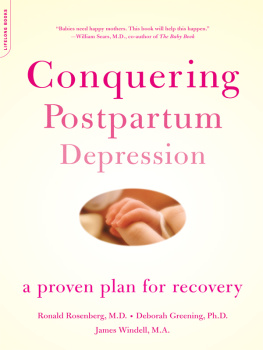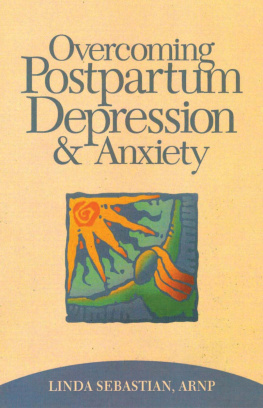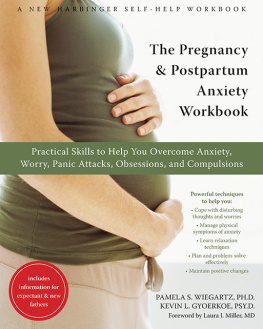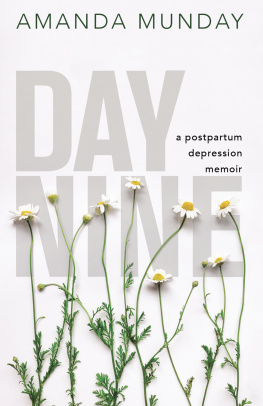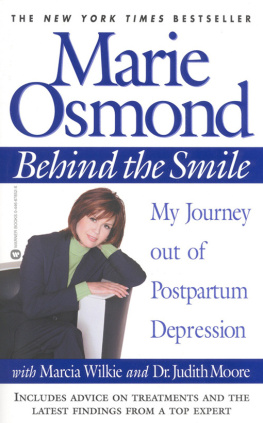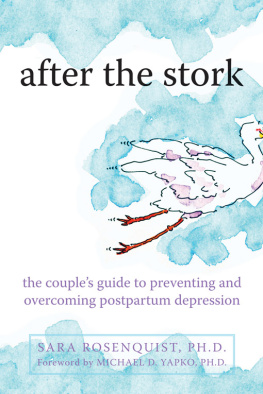Mothering Through the Darkness


Copyright 2015 by Stephanie Sprenger and Jessica Smock
All rights reserved. No part of this publication may be reproduced, distributed, or transmitted in any form or by any means, including photo-copying, recording, digital scanning, or other electronic or mechanical methods, without the prior written permission of the publisher, except in the case of brief quotations embodied in critical reviews and certain other noncommercial uses permitted by copyright law. For permission requests, please address She Writes Press.
Published 2015
Printed in the United States of America
ISBN: 978-1-63152-804-0
e-ISBN: 978-1-631528-05-7
Library of Congress Control Number: [LOCCN]
Design by Stacey Aaronson
For information, address:
She Writes Press
1563 Solano Ave #546
Berkeley, CA 94707
She Writes Press is a division of SparkPoint Studio, LLC.
For Eliza Margaret, my newest baby JAS
For Jess. You will be in our hearts forever. SCS
TABLE OF CONTENTS
Karen Kleiman
Jessica Smock & Stephanie Sprenger
Maggie Smith
Jen Simon
Celeste Noelani McLean
Dana Schwartz
Maureen Fura
Kate Kearns
Jill Robbins
Kara Overton
Alana Joblin Ain
Kristi Rieger Campbell
Elizabeth Bastos
Eve Kagan
Katie Sluiter
Randon Billings Noble
Jennifer Bullis
Dawn S. Davies
Michelle Stephens
Suzanne Barston
Estelle Erasmus
Denise Emanuel Clemen
Alexandra Rosas
Nina Gaby
Karen Lewis
Jenny Kanevsky
Melissa Uchiyama
Laura Miller Arrowsmith
Alexa Bigwarfe
Kim Simon
Lea Grover
Allie Smith
Becky Castle Miller
Susan Goldberg
Laura Haugen
Sarah Rudell Beach
FOREWORD
Imagine having a baby and becoming paralyzed by illness.
Imagine the stigma attached to becoming a new mother and wishing your baby away.
Imagine the shame of not sliding into this role with the grace and enthusiasm that everyone expected from you.
Recently, professionals and laypeople alike have begun paying attention to the impact of depression and anxiety after the birth of a baby. After decades of silent suffering, we are beginning to see greater advocacy and new legislation in support of women struggling with perinatal distress. Despite this increase in public awareness and a new national conversation, mothers continue to feel marginalized and hushed by a culture that refuses to listen. Expectations of unconditional maternal bliss continue to run rampant. The prevailing notion that mothers should endlessly radiate joy, paradoxically keeps them feeling sick, longer.
Motherhood is a magnificently challenging role, asking that women continuously adapt and adjust their identities, routines, priorities, and expectations. Emotions are out of control, life becomes unpredictable, and self-care becomes something of the past. Regardless of how many books have been read in preparation or how much support loving friends and family members provide, a large number of women are surprised at the extent to which they feel overwhelmed, overloaded, exhausted, unsupported, and completely, utterly, misunderstood.
Its hard enough to be a mother when everything turns out the way you hope it will. Mommy and baby are healthy. Dad is fabulous and supportive. Extended family is available and accommodating. Even when its idyllic, it can be a challenging journey. A woman with a postpartum mood or anxiety disorder experiences an additional and exceptionally complicated challenge. She unexpectedly finds herself face-to-face with one of lifes most cruel juxtapositions: trying to reconcile becoming a mother while wrestling soul-crushing emotions unlike any she has ever even remotely experienced.
The paradoxes inherent in motherhood within the context of emotional illness are often immobilizing: The elation and the despair. The ambivalence and the affection. The fury and the indifference. The irritability and the guilt. And then, there are the maddening thoughts. Like the thought that her baby would be better off without her. Or the worry that her husband will never love her again because she is unlovable. Or the belief that she made an irreparable mistake of unprecedented proportions and she should never have had this baby. Or, perhaps most unfathomable of all, if someone knew her innermost thoughts, would they take her baby away?
To the postpartum woman in distress, these secret thoughts are unimaginable, unspeakable, and unprintable.
Until now.
The indescribable distress experienced by depressed mothers is palpable. Courageous women have assembled in Mothering Through the Darkness: Women Open Up About the Postpartum Experience, to share their experiences in this collection of extraordinarily personal and private stories. The distinguished group of women identify strongly with their accomplishments as mothers transformed by both their babies and their illnesses, and also by their impressive achievements as educators, editors, lecturers, students, published writers, and award-winning poets.
This poignant anthology embraces the deep joy and excruciating distress of real women who believe in the healing power of self-disclosure through writinghealing themselves and healing the women who read their words. Recovery from postpartum depression and anxiety is a journey distinguished by tremendous triumphs and equally remarkable pain. It is precisely this contradiction which makes a postpartum womans experience so unique. Still, somewhat surprisingly, there exists little understanding of these intimate experiences. Denial persists. Misinformation is widespread. My hope is that these brave women who chose to defy the stigma will enlighten others with the honest portrayal of their fragile yet victorious tales.
Sarah Rudell Beach does a wonderful job capturing one of the overriding themes of the book when she declares: We can be shattered, and we can become whole again.
The words and sentiments throughout this book are heartbreaking and heartwarming. They are touching and provocative. For readers who dare to believe that good mothers feel a myriad of amazing and shocking emotions, the book will truly be inspirational.
Karen Kleiman, MSW, LCSW Founder & Director, The Postpartum Stress Center Author, Therapy and the Postpartum Woman: Notes on Healing Postpartum Depression for Clinicians and the Women Who Seek Their Help
INTRODUCTION
J rock back and forth in the glider, clutching my five-month-old daughter and squeezing my eyes shut. Every muscle in my body is clenched, and angry tears pour down my face. My baby wails, and I fight the urge to scream. My throat is raw with the unexpressed scream; it wants to come out. Why wont she sleep? Why cant I get her to sleep in her crib? What is wrong with me?
I berate myself, asking these questions over and over. I am a failure, an imposter. I have done everything wrong up to this point, leaving me with a baby who wont nap, an afternoon with no quiet, and a scream that wants so badly to come out. I am not sad. I am filled with rage. I battle against the urge to slap myself in the face. My hand twitches with the impulse to make contact with my cheek. I can feel the sting; it burns and yet soothes. But I cant do it. Women who rock crying babies shouldnt slap themselves in the face. But I want to.
Next page

